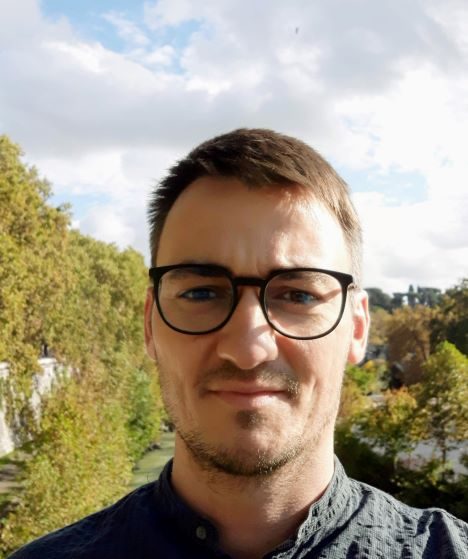Josip Parat diplomirao je arheologiju (2011), povijest (2013) te grčki jezik i književnost i latinski jezik i književnost (2014) na Filozofskom fakultetu Sveučilišta u Zagrebu. Doktorirao je na Poslijediplomskom doktorskom studiju arheologije s temom „Rimska obitelj na grobnim natpisima iz Donje Panonije tijekom principata“ (2022).
Bio je stipendist Talijanskog instituta za kulturu, Vlade Francuske Republike i Vlade Helenske Republike. Sudjelovao je na arheološkim istraživanjima u Ostiji (Italija), Apoloniji (Albanija) i na više domaćih lokaliteta. Stručno se usavršavao na Sveučilištu Lumière Lyon II, Francuskoj školi u Ateni, Humboldtovoj katedri za digitalnu humanistiku Sveučilišta u Leipzigu, Mađarskoj akademiji znanosti u Budimpešti i Francuskoj školi u Rimu. Sudjelovao je u radu hrvatske delegacije u Ottawi prilikom upisa Starogradskog polja i povijesne jezgre Staroga Grada na Hvaru na popis svjetske baštine UNESCO-a.
Radio je kao nastavnik grčkog i latinskog u Klasičnoj gimnaziji u Zagrebu (2014). Na Hrvatskom institutu za povijest bio je zaposlen kao stručni suradnik (2015-2017) i asistent (2017-2022). Surađivao je na znanstvenim projektima Hrvatske zaklade za znanost „Od prašuma do oranica: povijest šuma u Slavoniji od srednjeg vijeka do početka 20. stoljeća“ i „Novi životi antičkih natpisa: epigrafski spoliji na području srednje Dalmacije“. Sudjelovao je na 17 domaćih i 7 inozemnih znanstvenih skupova (Odense, Heidelberg, Berlin, Madrid, Bordeaux, Napulj, Basel). Sudjelovao je u radu Državnog povjerenstva za natjecanje iz povijesti. Kao vanjski suradnik držao je nastavu na Odsjeku za arheologiju i Odsjeku za klasičnu filologiju Filozofskog fakulteta Sveučilišta u Zagrebu. Član je Međunarodnog udruženja za grčku i latinsku epigrafiju (AIEGL). Dobitnik je Državne nagrade za znanost – Godišnje nagrade za znanstvene novake za 2019. godinu.
Od 1. travnja 2024. do 1. travnja 2025. boravio je na znanstvenom usavršavanju u École française de Rome u sklopu programa Odlazna mobilnost viših asistenata (HRZZ).
* * *
Josip Parat holds Master’s Degrees in Archaeology (2011), History (2013) and Greek and Latin Language and Literature (2014) from the Faculty of Humanities and Social Sciences, University of Zagreb. He received his PhD in Archaeology with the doctoral thesis "The Roman Family on Funerary Inscriptions from Lower Pannonia in the Principate" (2022).
He received scholarships from the Italian Cultural Institute, the French Government, and the Government of Greece. His research residencies include stays at Université Lumière Lyon II (France), the École française d'Athènes (Greece), the Humboldt Chair for Digital Humanities at the University of Leipzig (Germany), the Hungarian Academy of Sciences (Hungary), and the École française de Rome (Italy). He also participated in archaeological excavations at Ostia Antica (Italy), Apollonia of Illyria (Albania), Salona (Croatia), and other sites.
After teaching Greek and Latin at the Classical Gymnasium in Zagreb, he worked as a research assistant at the Croatian Institute of History (2015-2022). During this time, he contributed to multiple projects. He has presented at conferences both in Croatia and internationally, including in Odense, Heidelberg, Berlin, Madrid, Bordeaux, Naples, and Basel. As a teaching associate, he also taught at the Department of Classical Philology, University of Zagreb. In 2022, he was appointed as a postdoctoral fellow at the Chair of Classical Archaeology, Department of Archaeology. His scholarly work includes a commented translation of Lucian's How to Write History, along with publications in archaeology, history, and classical philology. He is a member of the Association Internationale d'Épigraphie Grecque et Latine (AIEGL). In 2020, he received the Croatian National Science Award for junior researchers.
From April 1, 2024 to April 1, 2025 he was a Research Fellow at the French School at Rome, as part of the Outbound Mobility of Research Assistants Programme, funded by the Croatian Science Foundation.


